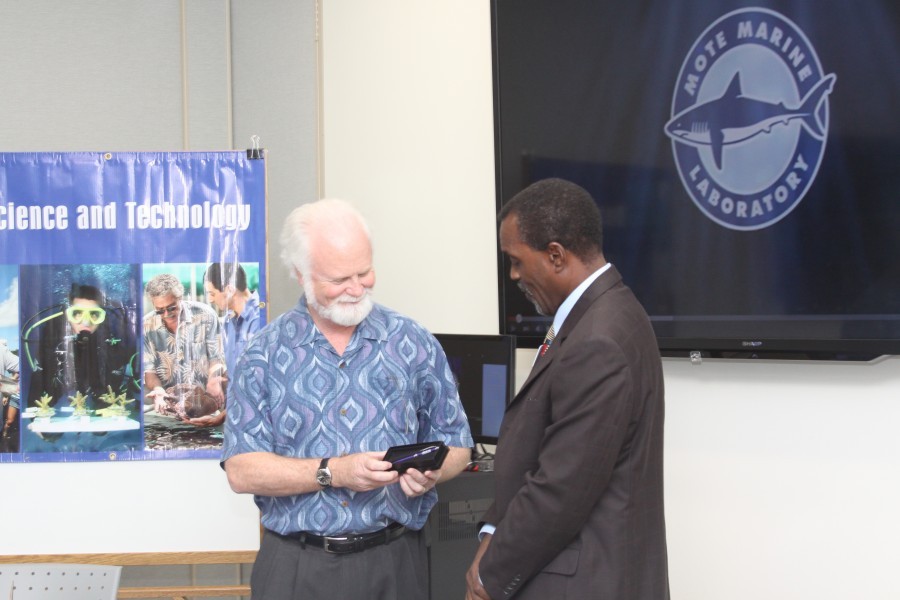Mote and Florida Keys Community College Forge Education Partnership
Mote Marine Laboratory and Florida Keys Community College (FKCC) forged a new education-focused partnership today that will benefit students, faculty and scientists while enhancing Keys-based research and restoration of marine resources such as coral reefs.
Leaders of the two institutions, Mote President and CEO Dr. Michael P. Crosby and FKCC President and CEO Dr. Jonathan Gueverra, signed a memorandum of understanding (MOU) today, Jan. 16, at FKCC’s Key West Campus. The MOU lays the foundation for collaborations in marine research and education serving the common missions and goals of both institutions.
Under this agreement, Mote and FKCC will explore exciting opportunities to partner in teaching, introduce more undergraduate students to the cutting-edge marine science at Mote’s research facility on Summerland Key and share research and education facilities and infrastructure.
Mote, an independent nonprofit marine science institution established in 1955, has six campuses stretching from its home base in Sarasota, Fla., to its research facility on Summerland Key. There, Mote scientists study the grand challenges facing corals reefs — including climate change and ocean acidification — and they have raised and planted thousands of coral fragments onto Florida’s depleted reefs. The Keys facility also serves as a base of operations for hundreds of other researchers from over 60 different institutions around the world and numerous students.
About 20 miles away is FKCC, the southernmost college of the “Great 28” in the Florida College System. Established in 1965, FKCC is an open-access, educational institution dedicated to serving the intellectual, diverse, cultural and occupational needs of the Florida Keys as well as the global community. The college is committed to student-centric academic programs and services, workforce development, continuing education, diverse partnerships, electronically delivered instruction and sustainable practices that prepare students for personal success and responsible citizenship.
The new MOU is a framework that will allow institution leaders, scientists and faculty to develop more specific plans for collaboration, with attention to:
Transitioning FKCC graduates to careers as technical-level marine scientists;
Exploring and developing educational exchanges, including faculty exchanges;
Providing student access to Mote’s marine science and technology educational and research resources;
Developing collaborative marine science and technology education programs and training courses;
Exploring feasibility of the design, development and implementation of marine science and technology workshops and conferences;
Exploring and developing joint marine science and technology research and education proposals to submit to funding agencies;
Exchanging marine science and technology materials and other information, as feasible;
Promoting the Florida Keys as a world hub for marine resource conservation and restoration;
Interpreting and publicly disseminating marine science and technology research;
Collectively celebrating the unique culture and ecology of the Florida Keys.
“This agreement is a win-win — it will help connect the bright minds at both our institutions and boost our services to Keys communities and ecosystems,” said Mote President and CEO Crosby. “Mote is dedicated to conducting world-class marine research in partnership with our communities, while helping to educate the next generation of marine scientists. We’re currently working to expand our operations in Monroe County, and this new MOU will help us achieve more while drawing focus to the unique natural and cultural setting of the Keys.”
“The College views this as an opportunity to strengthen its role in the marine science, conservation, restoration and forensic areas with a well-established and world-renowned organization,” said FKCC President and CEO Gueverra. “FKCC can provide the raw materials and inputs — namely students — who can ultimately become the world-class scientists such as those who work for Mote, and Mote can provide the best scientists to help educate and train the marine scientists of the future. Our collaboration is bound to help all parties involved in marine related activities.”
As leaders of learning in the Keys, Mote and FKCC staff have naturally teamed up in recent years — for example, partnering to receive a National Science Foundation grant for a tropical mariculture course. Mote scientists have taught a small number of FKCC courses and allowed two students to intern at Mote’s research facility in summer 2014.
“This agreement is really a natural for us,” said Dr. David Vaughan, Manager of Mote’s Coral Restoration Program, who oversees the Lab’s Summerland Key facility. “Our campuses are in close proximity, we have a lot of common goals and we’ve already been collaborating at a small scale; this is a chance to do much more. For example, it would be ideal to arrange an opportunity for students to get college credit for volunteering or interning at our lab. We now have a framework for investigating these possibilities.”
